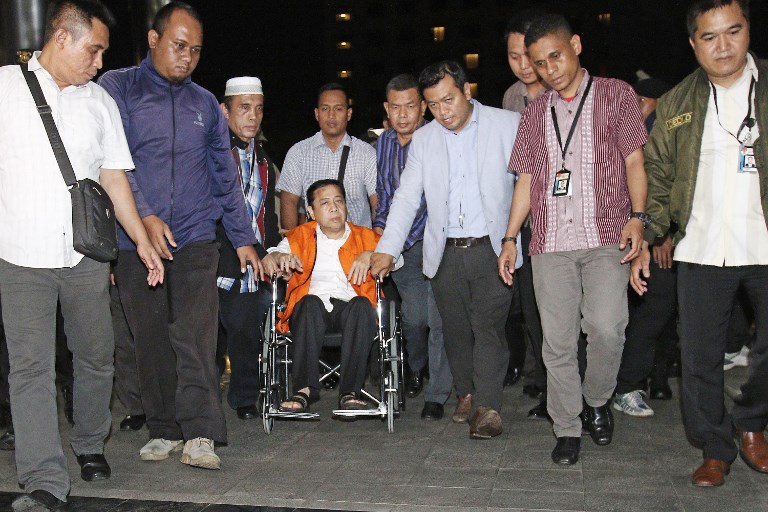A hefty 15-year prison term for one of Indonesia’s top politicians, who allegedly even staged a car crash to evade arrest, could be a turning point in the country’s war on corruption, observers say, as anger boils over against powerful figures living above the law.
Setya Novanto’s case sparked a mix of rage and disbelief as the disgraced house speaker tried to dodge arrest on graft charges, capped by his suspicious crash into a utility pole shortly after his palatial estate was raided.
The car accident — widely believed to have been engineered — landed Novanto in a Jakarta hospital bed with medical tubes up his nose, apparently one step ahead of pursuing anti-corruption investigators.
The images sparked a flurry of mocking online memes, including the popular #SaveTiangListrik (save the electric pole) hashtag.
It later emerged that Novanto’s now-indicted lawyer had booked his hospital room before the accident happened.
The 62-year-old — hailed by Donald Trump as one of Indonesia’s most powerful men several years ago — then unsuccessfully claimed that a bout of diarrhoea left him unable to participate in his trial.
On Tuesday, he was hit with one of Indonesia’s heaviest sentences for corruption after being convicted of taking millions of dollars in kickbacks and bribes linked to the national roll-out of government ID cards.
Novanto, dubbed Mr Teflon, had escaped corruption allegations before — including being caught on tape trying to extort a US-based miner — and his conviction marked the highest-profile victory in recent memory for Indonesia’s Corruption Eradication Commission (KPK).
“I think this is a milestone for the Corruption Eradication Commission and the anti-corruption movement in general,” said Adnan Topan, coordinator for the non-profit Indonesia Corruption Watch.
“Setya Novanto is very powerful. He has a strong network.”
– Payoffs and bribes –
Novanto was among dozens of politicians, government officials and businessmen implicated in the scandal, which saw an estimated US$170 million syphoned off the US$440 million ID card project.
It was the latest example of graft in a country where the legacy of notoriously corrupt dictator Suharto, suspected of looting billions of dollars from state coffers, still looms large.
Indonesia ranked 96th out of 180 countries on Transparency International’s 2017 corruption index.
It also scored a lowly 37 on a perceived public corruption scale, with 100 being “very clean” and zero “highly corrupt”.
The House of Representatives, where Novanto served as speaker, is widely viewed as one of Indonesia’s most graft-riddled institutions.
“Eradicating corruption and patronage go hand in hand — I don’t think they are going to be very easily removed from Indonesia’s politics,” said Deasy Simandjuntak, a visiting Indonesian researcher at the Singapore-based Institute of Southeast Asian Studies.
It is not only the political sphere that is tarnished by graft. Surveys show most Indonesians have encountered payoffs and bribes when dealing with the justice system.
“The institution that can really help Indonesia free itself from corruption is law enforcement officers,” Topan said.
“The KPK struggle to deal with this problem because the police have very strong political power.”
– ‘Gecko versus a crocodile’ –
Indonesia’s anti-graft agency has made numerous enemies since it was established in 2002, in particular the police who loathe its extensive powers to pursue cases and seek prosecutions in a special corruption court.
The force has baulked at KPK attempts to tackle police corruption, with Indonesia’s chief detective in 2009 famously mocking it as a “gecko versus a crocodile”.
In 2015, the KPK launched a corruption probe into three-star general Budi Gunawan, who just days earlier had been named the sole pick for national police chief. President Joko Widodo subsequently withdrew the nomination.
Two top anti-corruption officials were charged shortly after in a move widely seen as police revenge for the Gunawan probe.
Last year, a top KPK investigator was partially blinded in an acid attack while he was heading the Novanto case probe. No one has yet been arrested.
Despite the slow pace of reform, some see real progress in the push for cleaner governance.
“The public sees that the KPK’s efforts towards corruption eradication are bearing fruit,” Simandjuntak said.
“At the same time the public knows that patronage politics is inherited from decades-long practices…. Eradicating corruption is not an easy task.”




